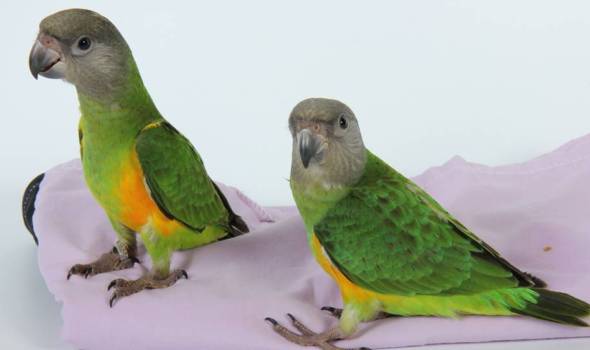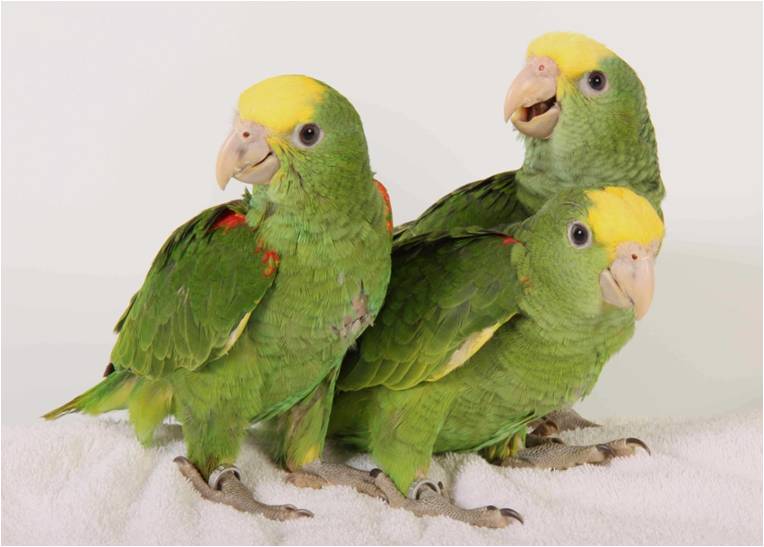
Early Parrot Education Stage 3 – Fledgling
Any nursery caretaker will appreciate that “Wow look at you!” moment when the chick pen cover is removed to discover the pre-fledgling is now proudly perched on the side of the chick pen quite comfortably on his own. This new accomplishment is a sure sign that the pre-fledgling is ready to move on to his new status –a fledgling! Of the 6 stages of EPE and Weaning Program, this new stage will involve the most dramatic desensitization period as a vast array of many new lessons and experiences will be introduced. We do caution that regression to the previous stage can occur. Lessons to include wing flapping (exercise), perhaps with possible flight, daily bathing, as well as foraging activities are introduced in a “classroom” setting.
Chick’s Physical Characteristics
- Feathers have emerged on approximately 95% of body
- Body weight now resting off hocks
- To the inexperienced eye chicks may even resemble adult birds
- Downsizing and firming of the crop continues
- Beak commissures have hardened
- Nails should still not be groomed
- Mobility is increased and chicks are resting off hocks now, using their beaks and wings to climb with more agility
Cage Set up
The fledgling will now transfer to a weaning cage. A weaning cage is small and will serve the fledgling with a strong sense of security. And, it will be covered at night, and during resting times in the day. This cage will offer very little distractions for the curious fledglings as it will contain only rope perches, multiple dishes with dry extruded weaning granules as well as water are strategically placed near the perches. For a short time during the fledgling stage, the weaning cage will possibly include a hiding box for an added retreat benefit. Measures are taken to ensure safety and security-as perches are strategically placed in low position to prevent overachievers from climbing too high before they have mastered skills in coordination and movement. One might consider the weaning cage to be sparse as novice caretakers are tempted to offer toys and other items of entertainment to the young bird at this stage. But, remember, the avian caretaker must maintain the fledgling’s focus!
Chick’s Educational Focus
Fledglings are exposed to other fledglings that have reached more advanced stages of weaning and training exercises for guidance. They are merely observers at this stage, and will become intrigued with the educational sessions as the older fledglings engage in this classroom atmosphere.
- Continuation of the weaning process; fledglings are encouraged to drink more water as they are consuming more dry granules
- More awake although may still needs to nap and retreat to chick pen “cavity”
- Mobility increased, resting off hocks now, using beak and wings to climb with more agility
- Complete misting activity followed by basking session to encourage wing flapping/exercise & self preening
- Clumsy/awkward flight must be supervised & guided
- Chicks are learning their place within a flock when misting /basking/foraging
- Stronger grip – perching much higher
- 1st basic command is introduced step up step down out of cage to scale perch
- Cognitive communication is encouraged – vocal communication /body language & eye contact now has more significance for mentoring
- Self preening education is encouraged as mobility increases
- Gradual supervised socialization with fledglings of other clutches
- Personalities are beginning to be revealed
- Foraging through exploration – foraging activities still take place inside the fledgling cage
- Due to crop regressing, more opportunity to advance the towel cradling exercise
- Desensitization to the nail manicure rotary tool or nail file to prepare chicks for slight grooming when able to perch confidently
- Flight harness can be worn more safely as crop has regressed
- This is definitely the time to establish the rules of conduct using modeling, mentoring, and gentle handling, but regrettably this is often when mentor caretakers overindulge in cuddling too much instead of encouraging independence. Fledglings become clingers at this stage if held too close and preened too close to body of caretakers; they then fear everything around them
- This is often the age when starvation weaning (intentional or unintentional) occurs. Weight monitoring and feces monitoring is imperative at this stage
- Still feeding weaning extrusion diet only at this age, additional to assisted feedings (spoon feeding or HFF syringe fed especially in morning and night)
- Offering granules soaked in warm water or assisted feedings if necessary (usually 4 times a day but will not touch commissures or encourage the fledgling to be fed like a chick bopping for large quantities). Do not want to enlarge the downsizing crop. Eating much more on their own if environment is healthy and other fledglings or flock mentors eat beside their cage. Still insisting all feeding be principally offered in fledgling cage…other than foraging for extruded diet on top of their fledgling cage when being misted and exercised.
To learn more about Stage 3 of the Early Parrot Education program and the techniques to use, we encourage you to review the slide presentation below.
Early Parrot Education & Weaning Program
Comprehensive and easy to follow, HARI’s EPE Program is available on 10 DVDs and comes with supporting documents including forms and charts (all provided on a CD), as well as complimentary reading material. The cost is only $70.00 for the complete program and supporting materials.
To order HARI’s EPE Program: Canada (international orders) order here, USA order here.



